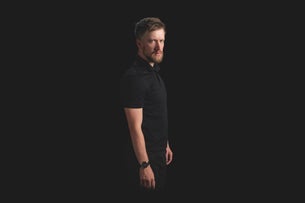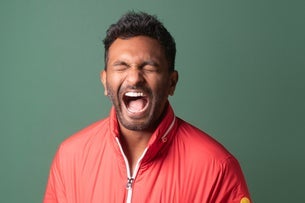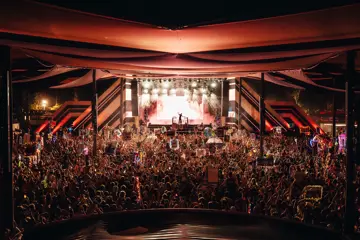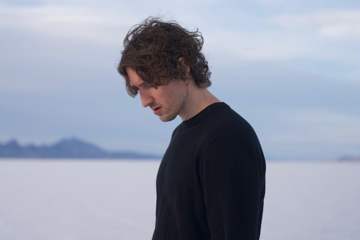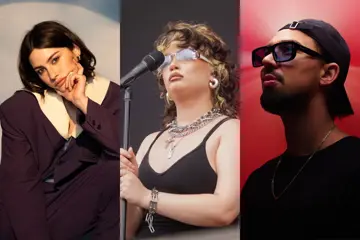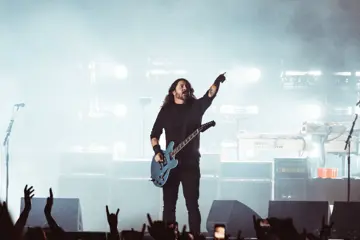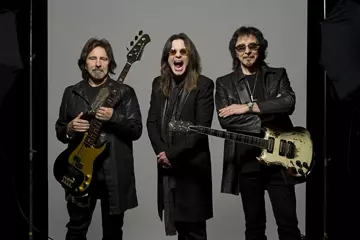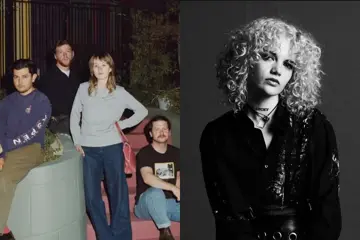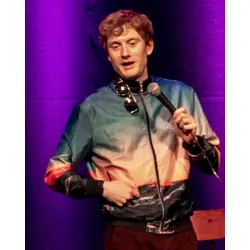 James Acaster
James AcasterDaniel Sloss, a 28-year-old comic from Scotland, became a Netflix 'It Boy' when his specials Dark and Jigsaw dropped on the streaming giant worldwide in September last year. The first explored the passing of his little sister when he was only nine, while Jigsaw, ostensibly about the joy of being single after a particularly bad break-up, has to date, as Sloss boasts, caused over 20,000 break-ups of its own. How does he feel about his newfound internet notoriety?
“I’m a fuckin’ big fan, aye, aye. It’s fuckin’ awesome, it’s vindicating, and it’s fun,” says Sloss, who brings his new show X, about toxic masculinity and sexual assault, to Australia this year.
James Acaster, a 34-year-old English stand-up, dropped Repertoire on Netflix back in March 2018, a series of specials he first performed across the globe between 2014 and 2016, Recognise, Represent and Reset, along with one hour tying them all together, Recap.
While Acaster has long been a regular at Aussie comedy festivals, when he tours his new hour Cold Lasagna Hate Myself 1999, which he says is an honest show "about the worst year of my life, 2017", this year, it’ll be his first time back in the country since Repertoire: “I'm really looking forward to seeing what the audience is like now that the specials have been out.”
Don't miss a beat with our FREE daily newsletter
For Melbourne’s Nazeem Hussain, 32, the reaction to his special – his half-hour Public Frenemy premiered as part of Comedians Of The World on New Years’ Day this year – has taken him by surprise. When he talks to us it’s the day after he did a surprise drop-in at a local backpacker bar, in preparation for a run of dates with his new hour Basic Idiot, which explores topics like phone addiction and new fatherhood, only to be approached after the show by people from around the world saying, “Oh my God, I just saw your Netflix special!”
"I'm just constantly getting direct messages and tweets from people in weird places around the world."
Plus, a Netflix special means he’s one step closer to meeting his heroes, listing off a slew of comics he admires, from Ali Wong to Dave Chappelle: “My favourite comedians have Netflix specials, so to be on the same platform as them is one step closer to being able to touch their face [laughs], or to meet them in real life.”
Both Sloss and Acaster had decided to go ahead and film their specials even before they got the green light from the global platform. Acaster says Netflix came on board just one week before they filmed the series in September 2017. He’d been touring the four shows around the world, from Australia and New Zealand to the UK, then shot them “on his own terms” in London, before the paperwork had even been signed.
“We always assumed we wouldn't get them on Netflix – when something is your number one choice you just have to tell yourself it probably won't happen. Once we got it on there that was amazing and they just gave us complete freedom: they let us film them however we wanted, edit them however we wanted.
“I got to make four specials on my own terms and put them on my ideal platform. I just feel incredibly privileged to have been able to do so. It's rare that you get to say, with anything in this job, that you're 100% happy with it but I really am with those.”
It only sunk in that it was real when the specials finally dropped. “The day that they were launched and they were on Netflix, that's when it felt real for the first time,” Acaster says. "And that was a really, really great feeling. And just a bit surreal as well. You've gotta brace yourself, 'Oh, loads of people are gonna see this.’ You know social media being what it is, 'Am I gonna get loads of shit now? Are people going to say that they're rubbish?’ And so I felt a bit of hesitance and fear and then yeah, as things progress, and you just get more and more nice messages, that's when you really feel this relief like, 'Oh, we did it.’”
Sloss meanwhile had been chasing a Netflix deal for “like four years” and had finally resolved to just film and release the shows himself, taping Jigsaw in Sydney in May 2017 before revisiting Dark in LA in February 2018. He remembers finding out he’d finally succeeded when he was gigging in Sofia, Bulgaria in October 2017.
“That morning I'd phoned my agent, and I think my exact words were something along the lines of, 'I don't need Netflix.'
“And then that night, [I] came off stage, and my agent was like, 'Phone me immediately,' and I was like, 'Oh, my mum's dead,' that's what that means, that's the only time anyone ever tells you to phone them immediately is whenever there's a fuckin' emergency. And then she phoned me up and told me I got two Netflix specials, and then I cried in a shower in Bulgaria for about an hour.”
Hussain too recalls vividly when he got the news about his slot on Comedians Of The World, which he shot in July last year at Montreal's Just For Laughs. He remembers getting the phone call from his manager really early in the morning and not being able to make out her words.
“She was like, 'Something, something, Netflix,' and I was like, 'What? Netflix?’ She goes, 'Nerr-nerr-nerr Netflix special!' I was like, 'Who's got a Netflix special?' She goes, 'You, you idiot!’”
“I think I woke the baby up, but it was exciting. But then also I started stressing out like, 'Oh no, is my material gonna suck?' But those are just the usual doubts that comedians and performers tend to have their whole artistic lives.”
For Acaster the appeal about a Netflix special is that it’s the “biggest platform” available to stand-ups today, and that it offers a certain amount of creative freedom. He cites the difference between releasing shows on a streaming service or on traditional television, where there’s constraints on running times, formats and timeslots.
“Being able to do four shows that link in together and release them wasn't a problem whereas it would be harder to pitch that to a TV channel.”
The space also allowed him to reach a long-held goal. “I got into stand-up through watching videos, VHSes, when I was a kid, and I really loved it. From the start what I wanted to do is film stand-up and release it.”
Acaster doesn't see people watching specials on Netflix – potentially never stepping into an actual comedy room – as something that takes away from the live experience. Instead he notes the challenges inherent to each platform. For filmed specials like Repertoire, "you have to make something for that medium" and are "able to do things you couldn't do live, like tight shots that are more zoomed in on the comedian's face or whatever, and pick up little facial expressions and then pull out to a wide".
"Obviously being in the room, there's that tension of watching a live show – it could go wrong – there's the feeling of being in an audience and laughter being contagious and being part of this group. At the end of the day, I'm glad that they both exist."
Hussain says streaming services have really “opened up the world to stand-up in a way that I can't remember seeing before”.
“Watching stand-up on television is hopefully enough of a hook to get people to come watch live shows... People just want to see live performance, they also wanna be around each other, I think sometimes comedians can kinda – not make sense of the world around them, but – laugh at the absurdity of the things that we all see around us.”
And as a comic Hussain sees the advantages of being able to watch specials from people from diverse backgrounds and far-flung locations. "It really exposes you to comedy that you probably wouldn't be able to see unless you're gigging in other countries, so you get a feel for different tastes and styles and subject matter, and without even needing to be in those places you can kinda understand what the audiences are receptive to."
For Sloss, streaming services mean anyone can watch specials “any time of the fuckin’ day, wherever you are in the world”. And they're also a way for him to effectively archive his shows.
"I write a new show every year, and when I've done it, I don't want it to be done, I want it to be stored in a fuckin' library, I want it to be out there for anyone to be able to consume – at any fuckin' point anyone can sorta watch it. It's the perfect thing to do is y'know tour it for a year and a half and then film it and then leave it on Netflix."
He also notes another perk for him as a comic – he doesn’t have to see audiences’ reactions. “People have probably turned it on and gone, 'This is fuckin' shit,' and I have no idea. I have no idea if anyone has ever hated the show and I never will unless they go online and fuckin' leave negative comments, but I've not seen any yet. The only thing I see is the change in venue size and the change in ticket sales and the change in career and everything – it's all gone up.”

